This article was medically reviewed by Sarah Gehrke, RN, MS. Sarah Gehrke is a Registered Nurse and Licensed Massage Therapist in Texas. Sarah has over 10 years of experience teaching and practicing phlebotomy and intravenous (IV) therapy using physical, psychological, and emotional support. She received her Massage Therapist License from the Amarillo Massage Therapy Institute in 2008 and a M.S. in Nursing from the University of Phoenix in 2013.
There are 11 references cited in this article, which can be found at the bottom of the page.
This article has been viewed 20,292 times.
Lantus is a common type of insulin prescribed to control diabetes. How large of a dose you need depends on a lot of factors, including your body's own ability to produce insulin, your weight, your diet, your stress levels, and your level of physical activity. If you suspect your dosage needs to be adjusted, you'll need to test your glucose overnight. If your glucose levels are outside the recommended range, you'll need to see your doctor for an adjustment.
Steps
Recognizing When Your Dosage Should be Adjusted
-
1Track any weight loss. The amount of insulin you get in each dosage of Lantus is based on a lot of factors, including how much you weigh. If you've lost or gained weight, more than 1 lb (0.45 kg) or 1 lb (0.45 kg), it might be time to adjust your dose.[1]
-
2Keep an eye on changes in your physical activity. The amount of physical activity you participate in can affect how much insulin your body produces on its own. If you begin or change a workout regimen, you might need an insulin adjustment.[2]
- You should also adjust your dose if you cease working out altogether.
Advertisement -
3Check with your doctor to see if your diabetes has progressed. Your doctor can let you know at your initial diagnosis if they believe your diabetes might progress. If it does, and your body produces less insulin on its own, you'll need to increase your dose. Ask your doctor how frequently you should be tested to see if insulin levels have changed.[3]
- If you lose weight with no explanation, find that you have to urinate more frequently, have blurry vision, or feel tired all the time, your diabetes may have gotten worse.
- There are a few factors that can cause your diabetes to progress, including weight gain and stress. If you've recently sustained an injury that makes moving harder, if you're not eating as healthy as usual, or if you have other health issues, you might gain weight.
-
4Talk to your doctor if your hormone levels change. Your hormone levels could change for a variety of reasons, but the most likely is if you take hormonal birth control. If you begin taking the birth control pill, make sure you discuss how it might affect your insulin dose.[4]
- Your hormone levels can also be affected by increased stress, changes in your thyroid, and digestive issues. If you're facing a lot of stress at work at home or notice that you have digestive issues like diarrhea or bloating, you should get your hormone levels checked.
- Your doctor will likely ask you to come back a week or two after you've started the pill to test your hormone levels. This will give them a better sense of your exact levels and help them determine what your Lantus dosage should be.
Testing Your Dosage
-
1Eat a healthy, low-fat dinner. Stay away from takeout or overly fatty or processed meals (like pasta with cream sauce or frozen dinners) on the night you're going to test your dosage. Instead, choose lean protein like chicken or fish and a side or 2 of vegetables.[5]
-
2Exercise as you normally would in the evening. If you normally exercise in the evening, you can still do so the night you're testing your dosage. However, keep the workout a little lighter than normal. If you overdo it on the exercise, it can affect your glucose levels and you won't get a true reading.[6]
- For example, if you normally go for a 30-minute run in the evening, cut it down to 20 minutes.
-
3Perform a bedtime glucose level check. Before you go to bed, and at least 3 hours after you've eaten dinner, you'll need to check your glucose levels. They should be between 80 mg/dL and 250 mg/dL to move forward with the test. Write down your reading.[7]
- If your glucose levels are below 80 mg/dL, have a snack and do the test another night. If your glucose levels are above 250 mg/dL, take a correction dose of insulin and try the test another night. Talk with your doctor if your levels are consistently outside of the target range, which is usually 80 to 130 mg/dL.[8]
-
4Check your glucose again in the middle of the night. You'll need to set an alarm to wake yourself up in the middle of the night. If your sleep schedule requires you to sleep during the day, set your alarm for halfway between bedtime and when you wake up. When the alarm goes off, test your glucose level and write it down.[9]
-
5Test your glucose when you wake up the next day. As soon as you wake up the next day, take another reading of your glucose level. Then compare your 3 readings: bedtime, middle of the night, and wake up. If they are within 30 mg/dL of one another, your dosage is probably fine. However, if they drop or rise more than 30 mg/dL between the tests, you'll need to see your doctor to have your dosage adjusted.[10]
- If your readings drop by more than 30 mg/dL, you'll need a decrease in your Lantus dose. If your readings rise by more than 30 mg/dL, you'll need an increase in your Lantus dose.
-
6Monitor your glucose during the day. It is also important to check your glucose levels during the day. Pay attention to your glucose levels before and after eating. Your levels should be between 80 and 130 mg/dL before meals and below 180 mg/dL 2 hours after you started eating a meal.[11]
Adjusting Your Dosage
-
1Set up an appointment with your doctor. If your glucose levels are not within the appropriate range, you'll need to see your doctor to adjust your Lantus levels. Do not change your dosage yourself at home.[12]
- Make sure you continue to eat and take your insulin as you normally would. Don't try to artificially change your levels before you see your doctor, since it will affect the adjustment they make to your insulin.
-
2Explain your health and lifestyle changes. When you see your doctor, make sure you have written down your nighttime and daytime glucose levels. You should also share your lifestyle or health changes that you think might require an insulin change. Your doctor might test your glucose at the time, or ask you to come back for a test, to make sure your dosage is adjusted accordingly.[13]
-
3Adjust your dosage. Your doctor will let you know whether you should change your dosage and by how much. They'll likely rewrite your prescription, so you get insulin in the proper dosage. Start using the new insulin immediately; don't wait until your old prescription runs out.
- Check your insulin dosage regularly to ensure that your dose is correct.
- If you notice that you start feeling depressed, drowsy, disoriented, or nauseated, your dose may be too high. See your doctor immediately if experience these symptoms
Warnings
- Do not adjust your Lantus levels on your own at home. Getting too much or too little insulin can have serious health ramifications.⧼thumbs_response⧽
References
- ↑ https://www.diabetesselfmanagement.com/managing-diabetes/treatment-approaches/getting-down-to-basals/
- ↑ https://journals.physiology.org/doi/full/10.1152/ajpendo.00765.2009
- ↑ https://www.cdc.gov/diabetes/managing/managing-blood-sugar/bloodglucosemonitoring.html
- ↑ https://www.ncbi.nlm.nih.gov/pmc/articles/PMC4135453/
- ↑ https://medlineplus.gov/diabeticdiet.html
- ↑ https://health.clevelandclinic.org/exercise-and-your-glucose-levels-does-timing-make-a-difference/
- ↑ https://my.clevelandclinic.org/health/diagnostics/12363-blood-glucose-test
- ↑ https://www.niddk.nih.gov/health-information/diabetes/overview/managing-diabetes/know-blood-sugar-numbers
- ↑ https://www.diabetesselfmanagement.com/managing-diabetes/treatment-approaches/getting-down-to-basals/
About This Article
If you think you need to adjust your Lantus dose, keep an eye out for any changes in your weight of 1 pound or more, which is a sign that your dosage might be off. Before talking to your doctor about changing your prescription, test your dosage by eating a healthy, low-fat dinner and exercising as you normally would in the evening. When you go to bed, check your glucose levels. If they are between 80 mg/dL and 250 mg/dL, you can move forward with the test. Then, set an alarm to wake yourself in the middle of the night to test yourself again. As soon as you wake up the next day, test your glucose levels again and compare all 3 results. If they drop or rise more than30 mg/dL between tests, talk to your doctor about adjusting your dosage. For more tips, including how to check with your doctor to see if your diabetes has progressed, scroll down.






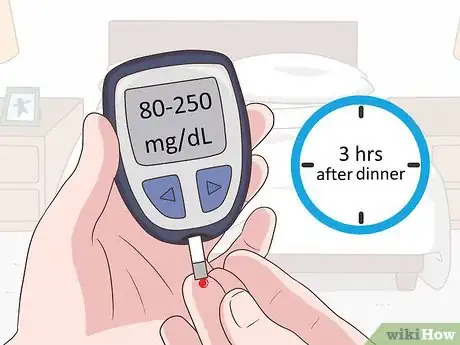
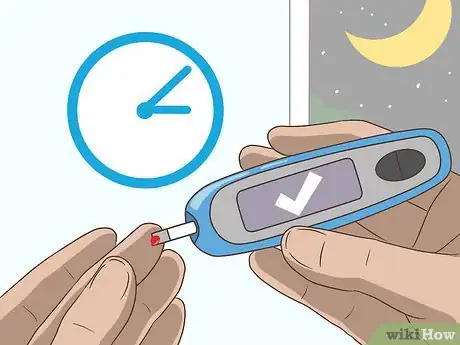
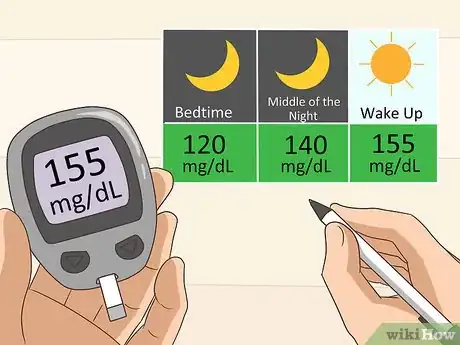
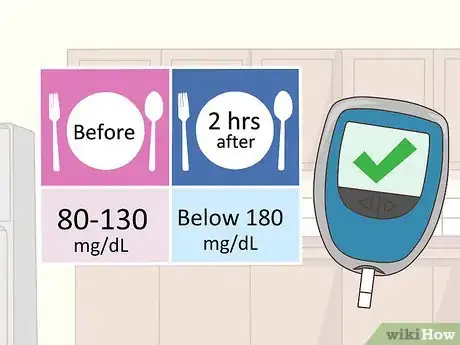


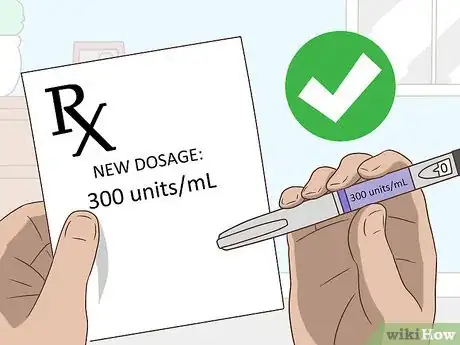






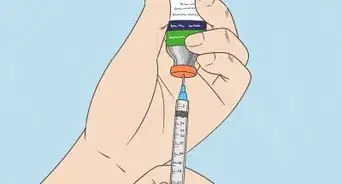



















































Medical Disclaimer
The content of this article is not intended to be a substitute for professional medical advice, examination, diagnosis, or treatment. You should always contact your doctor or other qualified healthcare professional before starting, changing, or stopping any kind of health treatment.
Read More...